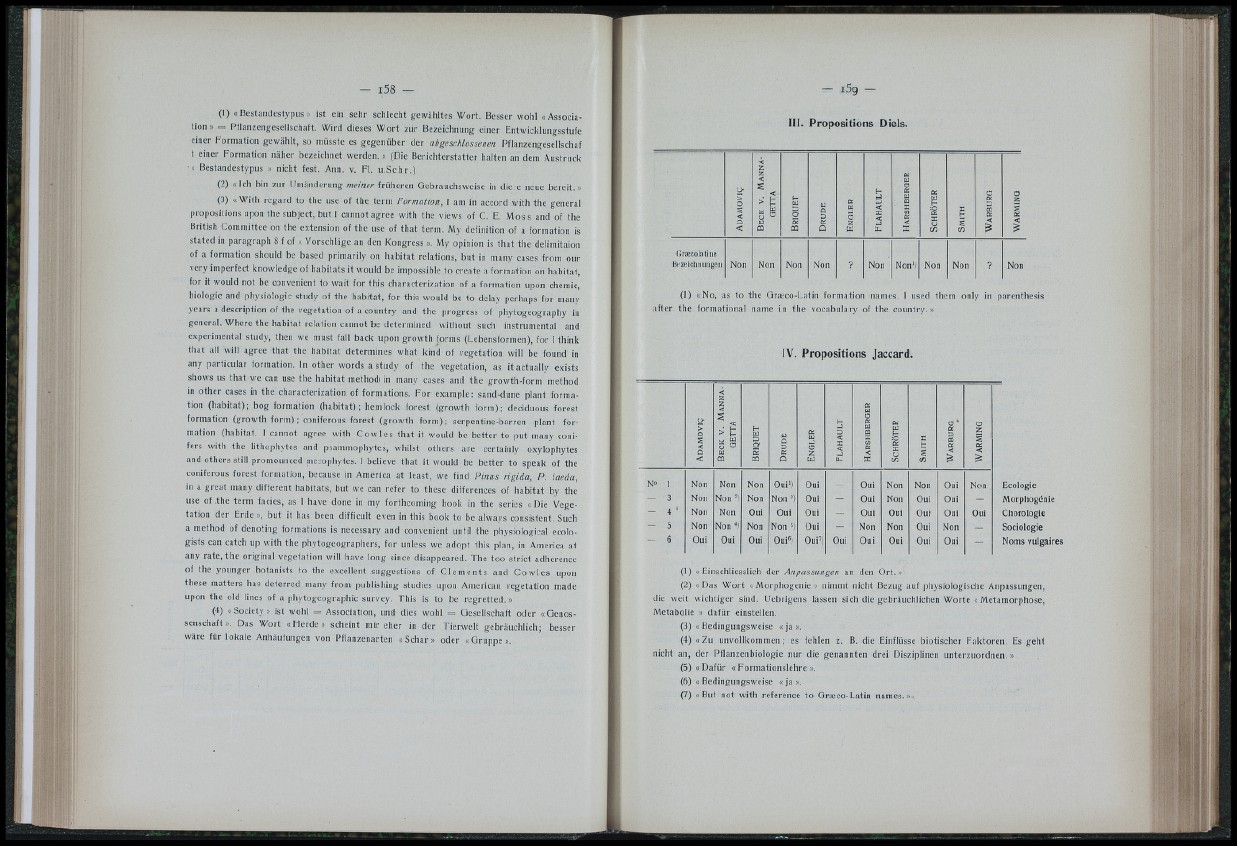
ä;räil!*i
ir.’!
(1) « Besfaiuicstypus » ist ein sehr schlecht gewähltes Wort. Besser wohl «As soc iation
» = Pflanzengesellschaft. Wird dieses Wort zur Bezeichnung einer Entwicklungsstufe
einer Formation gewählt, so müsste es gegenüber der abgeschlossenen Pflanzengesellschaf
t einer Formation näher bezeichnet werden. » (Die Berichterstatter halten an dem Austruck
■« Bestandestypus » nicht fest. Ann. v. Fl. u .Schr . )
(2) «Ich bin zur Umänderung meiner früheren Gebrauchsweise in die e neue bereit.»
(3) « With regard to the use of the term Formation, 1 am in accord with the general
propositions upon the subject, but i cannot agree with the views of C. E. Mo s s and of the
British Committee on the extension of the use of that term. My definition of a formation is
stated in paragraph 8 f of « Vorschläge an den Kongress ». My opinion is that the delimitaion
of a formation should be based primarily on habitat relations, but in many cases from our
vcry imperfect knowledge of habitats it would be impossible to create a formation on habitat,
for it would not be convenient to wait for this characterization of a formation upon chemic,
biologic and physiologic study of the habitat, for this would be to delay perhaps for many
yeai s a description of the vegetation of a country and the progress of phytogeography in
general. Where the habitat relation cannot be determined without such instrumental and
expeiimental study, then we must fall back upon growth forms (Lebensformen), for I think
that all will agree that the habitat determines what kind of vegetation will be found in
any particular formation. In other words a study of the vegetation, as it actually exists
shows us that we can use the habitat methodi in many cases and the growth-form method
in other cases in the characterization of formations. For example: sand-dune plant formation
(habitat); bog formation (habitat); hemlock forest (growth form); deciduous forest
formation (growth form) ; coniferous forest (growth form) ; serpentine-barren plant formation
(habitat. I cannot agree with C o w l e s that it would be better to put many conifers
with the lithophytes and psammophytes, whilst others are certainly oxylophytes
and others still promounced merophytes. I believe that it would be better to speak of the
coniferous forest formation, because in America at least, we find Pinus rigida, P. taeda,
in a great many different habitats, but we can refer to these differences of habitat by the
use of .the term facies, as 1 have done in my forthcoming book in the series « Die Veg e tation
der Erde », but it has been difficult even in this book to be always consistent. Such
a method of denoMng formations is necessary and convenient until the physiological e co lo gists
can catch up with the phytogeographers, for unless we adopt this plan, in America at
any rate, th e original vegetation will have long since disappeared. The too strict adherence
of the younger botanists to the excellent sugges t ions of C l em e n t s and C o w l e s upon
these matters has deterred many from publishing studies upon American vegetation made
upon the old lines of a phytogeographic survey. This is to be regretted. »
(4) «Society» ist wohl = Association, und dies wohl = Gesellschaft oder «Gen o s senschaft
». Das Wort «He rde» scheint mir eher in der Tierwelt gebräuchlich; besser
wäre für lokale Anhäufungen von Pflanzenarten «Schar» oder «Gruppe».
HI. Propositions Diels-
>o
<
Û<
<zz
<%
g = UICÛ
Hw3
g
Soa
wQDcx
Q
CXw _]
o
2
w
HD
<X<
X
B.
(X Bü oCUXJ XX <n tx <
X.
CXX
:0
ex
XuCO
XHs CO
caa OX z
cPQa csa
< <
( i ræc o h iUn e
Bi'zeicliiiiiiigcn Non Non Non Non Non Nonk Non Non Non
(1) «No, as to the Oraeco-Latin formation names. I used them only in parenthesis
after the formational name in the vocabulary of the country.»
IV. Propositions Jaccard!.
o>
og<
D
<
<
2
2 <C
S
<
> ^ V W g o
u CQ
là
i
ce
CQ
X
QD
ce
Û
ce
XJ
O2U
H
<X<-
J tl-
CX
X
o (X
XX
X
w
CX
<
X
CX
X
H:0 ce
Xo
CA)
X
Hg
CA)
oCX
DX CX <
o2
g ex <
N“ 1 Non Non Non Oui') Oui Oui Non Non Oui Non 1
3 Non Non Non Non 3) Oui -— Oui Non Oui Oui —
Ecologie
Morphogénie
Chorologie
Sociologie
Noms vulgaires
- 4 " Non Non Oui Oui Oui — Oui Oui Ouf Oui Oui (
— 5 Non Non Non Non G Oui — Non Non Oui Non —
- 6 Oui Oui Oui Oui®) OuF) Oui Oui Oui Oui Oui — 1
(1) «Einschliesslich der Anpassungen an den Crt. »
(2) « Das Wort « Morphogenie » nimmt nicht Bezug auf physiologische Anpassungen,
die weit wichtiger sind. Ucbrigens lassen sich die gebräuchlichen Worte « Metamorphose,
Metabolie » dafür einsteilen.
(3) « Bedingungsweise « ja ».
(4) «Zu unvollkommen; es fehlen z. B. die Einflüsse biotischer Faktoren. Es geht
nicht an, der Pflanzenbiologie nur die genannten drei Disziplinen unterziiordnen. »
(5) «Dafür «Formationslehre».
(6) « Bedingungsweise « ja ».
(7) « But not with reference to Oraeco-Latin names.»-